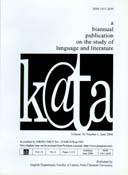She’s Really Kind and Hella Weird! ─ The Use of Intensifiers among Teens: A Sociolinguistic Analysis
Abstract
This study aims to reveal language variation of the use of intensifiers that occurs between male and female teens. This study will also examine the effects of gender through the use of adjectives intensification. Seeing that society have stereotype towards male and female, it is being one of problems that cause the differences in their language. To answer this problem, qualitative and quantitative approaches are undertaken. All participants are asked to share stories through free writing section. A later interview process is accomplished to clarify their further reasons of their intensifiers. The results show that there are significant differences of intensifiers used by males and females such as intensifiers amount, adjective types, degree, positive-negative evaluation, emotional value, intensifiers choices, and the use of double and taboo intensifiers. These differences are caused by several reasons with gender related. It has connection with power, politeness, expressions, emotion, society compulsion, and others.
Downloads
References
Barnfield, K. & Buchstaller, I. (2010). Intensifiers on Tyneside: Longitudinal developments and new trends. English World-Wide 31(3), 252-287.
Boncea, I.J. (2013). Hedging Patterns Used as Mitigation and Politeness Strategies. Annals of the University of Craiova. Series: Philology-English. 14(2), 7-23
Brown, P., & Levinson, S. (1987). Politeness: Some Universals in Language Usage. Cambridge: Cambridge University Press.
Bulgin et al. (2008). So very really variable: Social patterning of intensifier use by Newfoundlanders online. Linguistica Atlantica. 29, 101-115
Corey, O.J. (2014). Gender Differences in Intensifying Modifiers: So, Very, Really, and Pretty
Dixon, R. M. W. (1977). Where have all the adjectives gone? Studies in Language 1, 19–80.
Greenbaum, Sydney. (1974). Some Verb-Intensifier collocations in American and British English. American Speech, 49 (1/2): 79–89.
Holmes, J. (1992). An Introduction to Sociolinguistics. London and New York: Routledge
Huddleston, R. & Pullum, G.K. (2002). The Cambridge Grammar of the English Language. Cambridge: Cambridge University Press.
Karlsson, S. (2007). Gender-related Differences in Language Use. Ph.D Thesis. Lulea University. Sweden
Lakoff, R. T. (1975). Language and woman's place. New York: Harper & Row
Macaulay, R. (2006). Pure grammaticalization: The development of a teenage intensifier. Language Variation and Change. 18(3), 267-283.
Mills, J., Bonner, A., & Francis, K. (2006). The development of constructivist grounded theory. International Journal of Qualitative Methods 5(1), Article 3.
Moore, R. (2012). On swearwords and slang. American Speech. 87(2)
Murphy, B. (2010) Corpus and Sociolinguistics: Investigating Age and Gender in Female Talk. Amsterdam and Philadelphia: John Benjamins Publishing Company
O'Barr, W. M. (1982). Linguistic evidence: Language, power, and strategy in the courtroom. New York: Academic Press.
Palacios-MartÃnez, I. (2011). The Language of British Teenagers: A Preliminary Study of its Main Grammatical Features. Journal of the Spanish Association of Anglo-American Studies. 33(1), 105-126
Palacios-MartÃnez, I. & Núñez-Pertejo, P. (2012). Intensifiers in MLE: New Trends and Development.
Pérez-Paredes, P., & DÃez-Bedmar, B. (2012). The use of intensifying adverbs in learner writing. In Y. Tono, Y. Kawaguchi, & M. Minegishi (Eds.), Developmental and Crosslinguistic Perspectives in Learner Corpus Research. John Benjamins
Peters, H. (1994). Degree adverbs in Early Modern English. In Dieter Kastovsky (ed.), Studies in Early Modern English, 269–88. Berlin and New York: Mouton de Gruyter.
Quirk et al (1985) A Comprehensive Grammar of the English language. New York: Longman.
Saarenpää, T. (2016). A Comparative Corpus Study on Intensifiers in Canadian English and New Zealand English. MA Thesis. University of Tampere. Finland
Sardabi, N. & Afghari, A. (2015). Gender Differences in the Use of Intensifiers. Journal of Applied Linguistics and Language Research. 2(7), 203-213
Sari, I. (2015). An Analysis of Apology as a Politeness Strategy Expressed by the Characters in the Film “Princess Diaries 2â€: A Socio pragmatic Approach. Universitas Katolik Widya Mandala Madiun.
Schwizer, N. (2014). Intensifiers: An Actively Changing Feature in Present-Day English: The degree words damn, bloody, fucking, very, really and so. A corpus-based apparent-time study (BNC). Seminar Paper. University of Zurich.
Tagliamonte, S. (2008). So different and pretty cool! Recycling intensifiers in Toronto, Canada. Language and Linguistics 12(2), 361-394.
Wardhaugh, R. (2006). An Introduction to Sociolinguistics. Malden, Mass., USA : Blackwell

This work is licensed under a Creative Commons Attribution 4.0 International License.
![]() This work is licensed under a Creative Commons Attribution License
This work is licensed under a Creative Commons Attribution License




.png)
.png)

.png)












